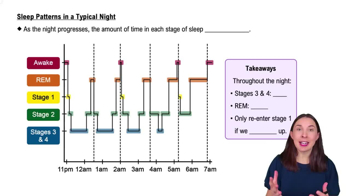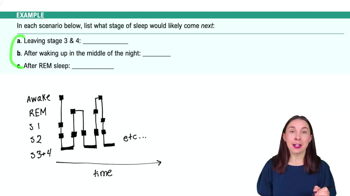Table of contents
- 1. Introduction to Psychology1h 43m
- 2. Psychology Research2h 20m
- 3. Biological Psychology2h 41m
- 4. Sensation and Perception28m
- 5. Consciousness and Sleep32m
- 6. Learning41m
- 7. Memory34m
- 8. Cognition37m
- 9. Emotion and Motivation35m
- 10. Developmental Psychology33m
- 11. Personality48m
- 12. Social Psychology41m
- 13. Stress and Health41m
- 14. Psychological Disorders44m
- 15. Treatment47m
5. Consciousness and Sleep
Sleep
Struggling with Psychology?
Join thousands of students who trust us to help them ace their exams!Watch the first videoMultiple Choice
Alcohol stimulates the release of _____, the brain's major depressant.
A
GABA
B
endorphins
C
thyroxin
D
serotonin
 Verified step by step guidance
Verified step by step guidance1
Identify the role of alcohol in the brain: Alcohol is known to have a depressant effect on the central nervous system.
Understand the function of GABA: Gamma-Aminobutyric Acid (GABA) is the primary inhibitory neurotransmitter in the brain, which means it reduces neuronal excitability.
Consider how alcohol interacts with neurotransmitters: Alcohol enhances the effects of GABA, leading to increased inhibitory effects in the brain, which contributes to its depressant properties.
Evaluate the options: Endorphins are neurotransmitters that act as natural painkillers and mood enhancers, thyroxin is a hormone related to metabolism, and serotonin is a neurotransmitter that affects mood and emotion.
Conclude that GABA is the neurotransmitter that aligns with alcohol's depressant effects, as it is the brain's major inhibitory neurotransmitter.

 3:25m
3:25mWatch next
Master Circadian Rhythms with a bite sized video explanation from Hannah Gordils
Start learningRelated Videos
Related Practice


































































































![Race, Genes and IQ Differences | Bret Weinstein [Mini Clip]](https://img.youtube.com/vi/IztL_m3pd70/mqdefault.jpg)



































































































